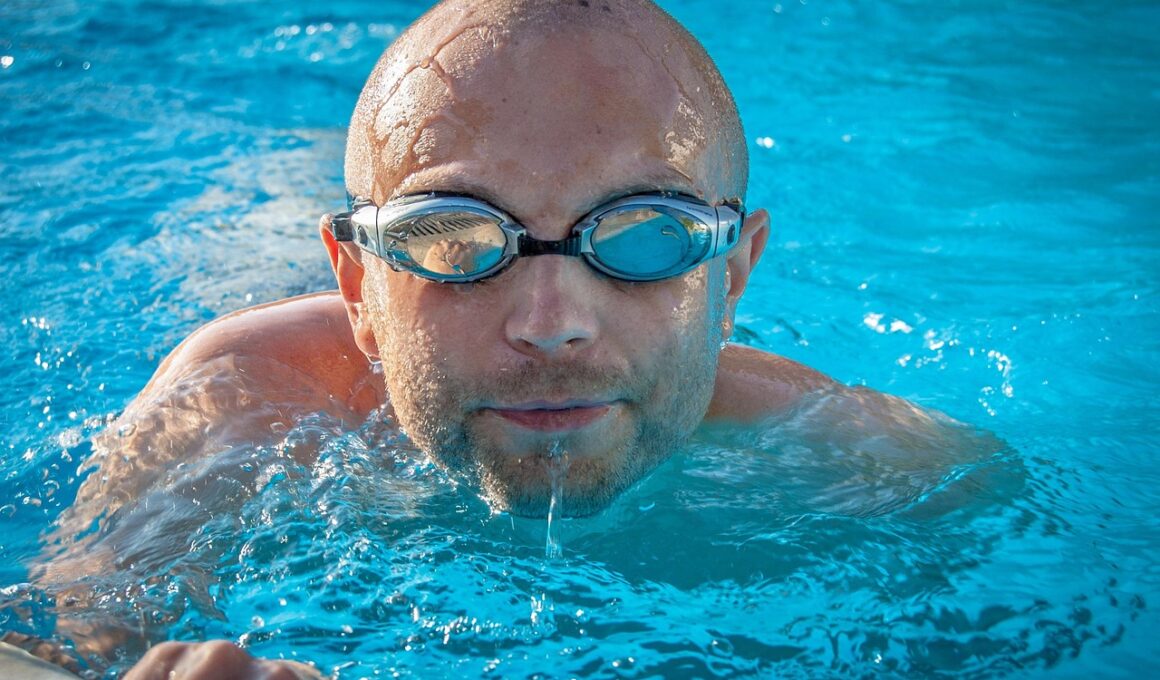Oral Health Considerations for Swimmers and Water Sports Participants
Participating in water sports and swimming offers various benefits, including physical fitness and fun social activities. However, it can also impact oral health significantly. Swimmers often experience exposure to chlorine in pools, which can lead to various dental issues. Chlorine exposure is linked to dry mouth, increasing the risk of cavities and gum disease. To maintain your dental health, you should take preventive measures. A good oral hygiene routine is essential, including brushing twice daily and flossing regularly. Consider using a fluoride toothpaste to help protect against decay. Regular dental check-ups should not be overlooked. Hydration is crucial too; drinking plenty of water can help counteract dry mouth effects. Consider the food you eat post swimming, opting for nutritious snacks instead of sugary sweets. Avoid sitting in hot tubs excessively as the heat can aggravate oral tissues. Lastly, wearing a mouthguard during water sports can protect your teeth from injuries. With these tips, swimmers can enjoy their time in water while maintaining a healthy smile and avoiding dental problems.
Conducting swim practice is essential for athletes; however, it can have adverse effects on oral health. Chlorinated water contributes to a condition known as chlorinated water syndrome, which often leads to problems like tooth sensitivity and an increase in cavities. The pH imbalance created by chlorinated pools can erode tooth enamel over time. To mitigate these risks, it is essential to notice signs immediately. If you experience discomfort, it’s best to consult your dentist promptly. Rinsing your mouth with non-chlorinated water post-swim can also help offset acidic buildup inside your mouth. Chewing sugar-free gum can be beneficial in stimulating saliva production, which aids in remineralizing tooth enamel. Additionally, consider using a non-alcoholic mouthwash that hydrates your mouth and freshens breath after swimming. Encouraging good dietary habits can also assist oral health; consumption of crunchy fruits and vegetables can aid in cleaning teeth. It’s vital for swimmers and water sports enthusiasts to factor in their dental health along with their athletic performance to maintain an overall healthy lifestyle.
Protect Your Teeth While Swimming
Swimmers should understand the importance of protecting their teeth during their aquatic activities. Prolonged exposure to chlorinated water can significantly weaken the tooth structure. The heightened acidity in swimming pools can lead to tooth erosion, which is irreversible. Therefore, wearing a mouthguard is advised, particularly for water polo players and those engaging in high-impact sports. Mouthguards serve to protect the teeth from potential impacts and also create a barrier from harmful chemicals in pool water. A well-fitted mouthguard is crucial to ensure maximum protective benefits. Additionally, it would be best to consider wearing sunglasses to shield your eyes from chlorinated water which can indirectly impact your overall health. Individuals who swim outdoors should also be mindful of sunscreen application. Protecting your skin helps maintain your overall health, which directly correlates to dental health. Furthermore, focusing on nutrition plays a significant role; opting for foods high in calcium can strengthen teeth. Parents should encourage children to adopt these habits early to establish lifelong dental health practices, especially for young swimmers.
Regular dental check-ups improve overall health, particularly for swimmers. Dentists can detect early signs of dental issues related to swimming, providing valuable guidance. Regular cleanings help remove plaque that builds up from acidic exposure, preserving enamel integrity. If any signs of decay or erosion appear, timely intervention can prevent extensive damage. Furthermore, speaking with your dentist about potential treatments, such as fluoride applications, can help strengthen teeth. Professional advice on oral care products that best suit swimmers is also invaluable. Look for toothpaste containing calcium phosphate, as these can aid in enamel remineralization. Establishing an effective oral hygiene routine after swimming is pivotal. Rinsing with water post-exercise can wash away contaminants and acids. Use a soft-bristled toothbrush and avoid abrasive toothpaste to prevent enamel wear. Aim for biannual professional cleanings to maintain a healthy mouth. Staying informed about dental health trends and tips specific to aquatic sports can help swimmers navigate potential challenges. It’s essential not to overlook dental health while enjoying the benefits of swimming and other water sports, as it’s crucial for overall vitality.
Dietary Impact on Oral Health for Swimmers
The diet of swimmers plays a significant role in their oral health. Staying hydrated is critical, particularly for athletes engaging in strenuous activities. Water consumption not only aids in maintaining hydration but also flushes away harmful bacteria and acids in the mouth. Swimmers should avoid sugary beverages, opting instead for water to promote dental health. Consuming crunchy fruits and vegetables is beneficial; these foods help in cleaning teeth naturally. Foods high in fiber aid in stimulating saliva production, which serves as a natural buffer to counteract acidity. Calcium-rich foods such as dairy products support tooth structure and bone strength. If indulging in snacks post-swim, opt for healthy options like nuts or yogurt. Avoid sticky candies that may cling to teeth, increasing the risk of cavities. It is also critical to minimize the intake of acidic foods or beverages, as they can exacerbate tooth erosion. Balance and moderation in food choices ensure optimized performance while supporting healthy dental habits, integral for a swimmer’s overall well-being and endurance.
Incorporating mindful eating habits into a swimmer’s routine greatly influences oral health. Practicing moderation and discipline when snacking could prevent oral complications. Additionally, reheating food repeatedly can lead to the loss of beneficial nutrients, which directly affects overall health. Opting for fresh, nourishing meals instead of processed foods helps maintain energy levels while keeping your smile intact. Healthier meals can also improve recovery times after intense training by providing ample nutrients necessary for muscle repair and growth. It’s advisable to have a routine where meals and snacks are planned, making it easier to stick to healthy dietary choices. After swimming practice, filling up on nutrient-dense foods yields positive results for both performance and dental health. Emphasizing a balanced diet, coupled with proper hydration, enhances a swimmer’s overall performance. Incorporating habits such as making smoothies packed with greens and protein can boost energy levels. Additionally, paying attention to your snack’s consistency is crucial; soft snacks are less damaging to teeth. Prioritizing health-conscious choices can significantly diminish the risk of dental problems among swimmers, ensuring they enjoy their time in the water without concerns.
Conclusion: The Importance of Dental Health for Water Sports Participants
Concluding, it is imperative for swimmers and water sports participants to recognize the relationship between their oral health and aquatic activities. By implementing preventive strategies, individuals can enjoy their sports while keeping their dental health intact. Consistency in oral hygiene routines, such as regular brushing and flossing, is vital. Equally important is maintaining regular visits to the dentist, making it easier to spot problems before they escalate. Education about risks from chlorinated water can empower swimmers to adopt protective measures against dental issues. Choosing a nutritious diet while focusing on hydration supports both dental and athletic health. Moreover, wearing protective gear like mouthguards can greatly reduce visible injuries while swimming. Encouragement can also stem from inspiring others to follow suit in maintaining dental health practices. Engaging in discussions about health awareness within the swimming community creates a solid foundation for collective well-being. Further research may also shed light on the evolving needs of water sports participants regarding dental health. By taking these considerations seriously, swimmers can maximize their performance and enjoy their activities worry-free.
These insights aim to help swimmers and water sports enthusiasts prioritize dental health. As awareness of oral health impacts on overall wellness grows, promoting good practices is crucial for sustaining a healthy lifestyle. Mindful preparation, robust dietary choices, and excellent oral hygiene foster a harmonious balance between sports and dental well-being.


